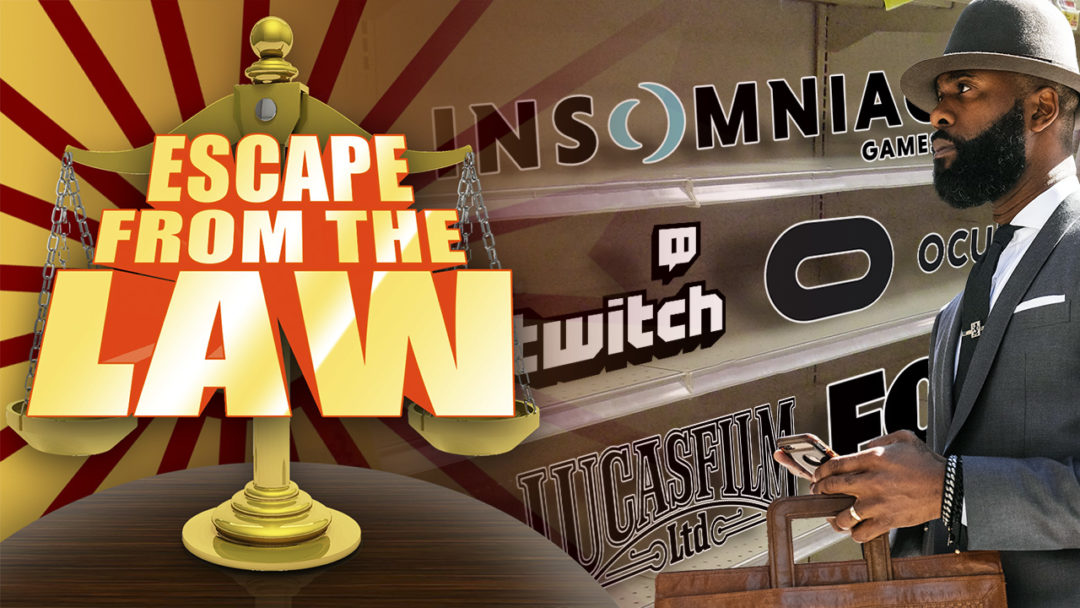Now that the 2010s are over, it’s safe to say that the last decade was full of legal events and movements that had a profound impact on entertainment and video games. This week, I’ll take a retrospective look at some of the most significant legal developments from the last decade, and will consider how the developments have changed our relationship with video games and entertainment.
1. Acquisitions!
There were almost too many major acquisitions in the 2010s to count. Some of the most significant acquisitions include the following:
- Disney buys Lucasfilm (including the LucasArts video game studio) (2012)
- Chaser: George Lucas calls Disney “white slavers.”
- LucasArts shuts down, resulting in Battlefront II’s “Candy Crush Star Wars” and eventually the generally liked Fallen Order.
- This happened.
- Amazon buys Twitch (2014), and Twitch users skyrocket.
- Facebook buys Oculus Rift (2014), jump starting the birth/rebirth (depending on your perspective) of virtual reality gaming, with PlayStation VR, HTC Vive, and Valve Index coming later in the decade.
- Disney buys BAMTech to develop Disney+ (2016-2017).
- AT&T acquires Time Warner (2018).
- Disney buys Fox (2019).
- Sony acquires Insomniac Games, the developer of Spider-Man and Ratchet & Clank (2019).
Regardless of whether you think major acquisitions and consolidations are beneficial, it cannot be denied that they had a profound effect on the media and gaming landscape. They immediately set new industry-wide trends, as demonstrated by the rush to virtual reality that started after Facebook’s acquisition of Oculus and by the bevy of new streaming services that seem to be inspired by Disney+.

2. Gamergate and the #MeToo Movement
At first glance, it might seem strange to put Gamergate and #MeToo together, since they technically took place three years apart (Gamergate in 2014, and #MeToo in 2017). But as I wrote last year, there is a strong argument to be made that Gamergate was basically a prologue to the #MeToo movement.
What might be the biggest difference between Gamergate and #MeToo is a role reversal. #MeToo was a movement started by women following the exposure of allegations of sexual misconduct against Harvey Weinstein. From there, the movement picked up steam, as more women came forward with allegations against other powerful men.
Gamergate, on the other hand, was something of the reverse. Instead of originating from victims of attacks, Gamergate was a harassment campaign against women. Wikipedia describes Gamergate as an anonymous “harassment campaign (that) targeted several women in the video game industry.” According to Wikipedia, “Many supporters of Gamergate oppose what they view as the increasing influence of feminism on video game culture,” such that “Gamergate is often viewed as a right-wing backlash against progressivism.”
Gamergate made enough noise that it registered on the radar of people outside the video game community, and it shed public light and scrutiny on one of the most shameful aspects of video game culture. As might be expected, the major development companies and publishing studios made statements condemning harassment and discrimination in the industry. However, since Gamergate started with video game consumers, industry leaders could only do so much. Indeed, while Gamergate harassment is not as loud or prominent as it was before, it’s still out there.
When the #MeToo movement arrived, more attention was paid to discrimination and harassment that took place within development studios and in software development more generally, resulting in gender discrimination lawsuits and a renewed call for the video game development community to adopt a more inclusive, non-discriminatory conception of what it means to be a “video gamer.”
Together, the video game-specific Gamergate and culture-wide #MeToo movements serve as a powerful reminder of all the work that needs to be done to make gaming work for everyone.

3. Loot Boxes
If the 2010s were a Star Wars movie, the title could be “Episode 2010s: The Rise of Loot Box.” Granted, loot boxes technically existed at the start of the decade, but it wasn’t until the 2010s that they really exploded. While the early proliferation took place in the world of mobile gaming in games like FarmVille, it wasn’t long before loot boxes appeared in major AAA titles like Mass Effect 3 and Overwatch.
Over time, the role of the loot box in AAA titles changed. At first, the contents were not all that significant. For example, Team Fortress 2 offered funny hats, and Counter-Strike: Global Offensive offered non-functional weapon skins. Later, however, developers started providing non-trivial competitive advantages via loot box for both single-player and multiplayer purposes. These loot boxes are wildly profitable but have led to a fairly sizable backlash from within the gaming community, whom feel that the boxes promote unhealthy gambling-like habits and detract from the quality of gameplay.
Consumer frustration has also brought loot boxes to the attention of legislators who are currently considering methods to regulate the use of loot boxes. While there was a noticeable decline in the use of loot boxes in AAA games in the last year or two of the decade (though not in mobile games), they are still out there, lurking, ready to strike at a moment’s notice. They are the ones who knock, and they are the pathway to abilities that many consider to be unnatural.
4. Europe’s General Data Protection Regulation
The 2010s were quite a roller coaster for consumer privacy. It was only in 2013 that Edward Snowden revealed that the NSA spies on everyone. Over the course of the decade, Facebook has had a seemingly endless barrage of privacy scandals, and consumers have had personal and financial information leaked, stolen, or breached several times.
While the United States political apparatus is… less than efficient, Europe gets things done. In 2016, Europe passed the “General Data Protection Regulation” (GDPR), which went into effect in 2018. The GDPR requires companies to protect consumers’ personal data and to notify their users of the privacy controls that are in place. While the GDPR only binds companies that collect data from European consumers, most major companies operate in Europe, and thus it ensures compliance across the board. The GDPR has also inspired several states to adopt similar regulations. While there is still more work to do to secure our privacy, the GDPR is a giant step forward for consumer privacy interests.

Looking Ahead
The last decade was full of developments. But as one decade ends, the next begins, and even at this early stage, it is clear that our next legal battles are about to begin:
- In an age of internet gaming, data is king. We use data to download, stream, and share video games and to come together as a gaming community. Yet the status of net neutrality and data fairness is as of yet unsettled.
- In 2018, we witnessed one of the worst aspects of game development in connection with the excessive and unfair demands placed on Rockstar employees in connection with the release of Red Dead Redemption 2. The “crunch” problem has not been solved and will continue to plague the industry as the ’20s begins.
- The United States is at war with China over trade. In connection with the trade war, the United States has imposed tariffs on goods imported from China. While it’s not clear how this will play out, companies like Microsoft and Sony are rightly concerned that the tariffs will make it difficult to produce affordable consoles. This is especially concerning with respect to the upcoming Xbox Series X and PlayStation 5 consoles, which are expected to release this year.
And that is the 2010s (and a sneak peek at the 2020s) in a nutshell. The last decade has certainly been eventful, and even though there are some unsettled problems lurking in our future, it’s clear we have a lot to be excited for in the coming years.






Published: Jan 5, 2020 03:00 pm